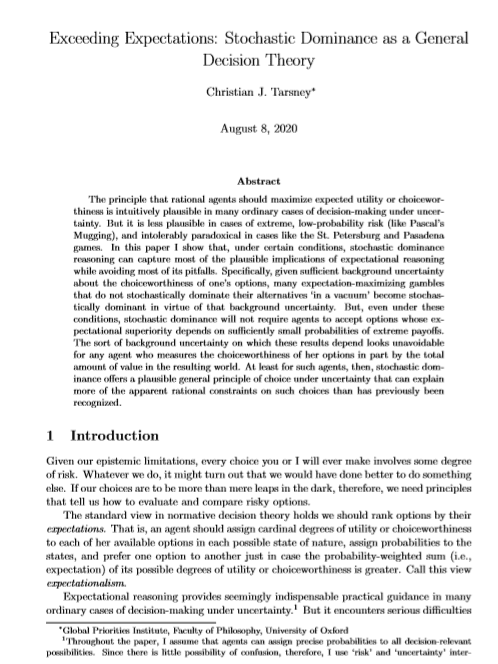Exceeding expectations: stochastic dominance as a general decision theory
Christian Tarsney (Global Priorities Institute, Oxford University)
GPI Working Paper No. 3-2020
The principle that rational agents should maximize expected utility or choiceworthiness is intuitively plausible in many ordinary cases of decision-making under uncertainty. But it is less plausible in cases of extreme, low-probability risk (like Pascal’s Mugging), and intolerably paradoxical in cases like the St. Petersburg and Pasadena games. In this paper I show that, under certain conditions, stochastic dominance reasoning can capture most of the plausible implications of expectational reasoning while avoiding most of its pitfalls. Specifically, given sufficient background uncertainty about the choiceworthiness of one’s options, many expectation-maximizing gambles that do not stochastically dominate their alternatives ‘in a vacuum’ become stochastically dominant in virtue of that background uncertainty. But, even under these conditions, stochastic dominance will not require agents to accept options whose expectational superiority depends on sufficiently small probabilities of extreme payoffs. The sort of background uncertainty on which these results depend looks unavoidable for any agent who measures the choiceworthiness of her options in part by the total amount of value in the resulting world. At least for such agents, then, stochastic dominance offers a plausible general principle of choice under uncertainty that can explain more of the apparent rational constraints on such choices than has previously been recognized.
Other working papers
Against Willing Servitude: Autonomy in the Ethics of Advanced Artificial Intelligence – Adam Bales (Global Priorities Institute, University of Oxford)
Some people believe that advanced artificial intelligence systems (AIs) might, in the future, come to have moral status. Further, humans might be tempted to design such AIs that they serve us, carrying out tasks that make our lives better. This raises the question of whether designing AIs with moral status to be willing servants would problematically violate their autonomy. In this paper, I argue that it would in fact do so.
AI takeover and human disempowerment – Adam Bales (Global Priorities Institute, University of Oxford)
Some take seriously the possibility of AI takeover, where AI systems seize power in a way that leads to human disempowerment. Assessing the likelihood of takeover requires answering empirical questions about the future of AI technologies and the context in which AI will operate. In many cases, philosophers are poorly placed to answer these questions. However, some prior questions are more amenable to philosophical techniques. What does it mean to speak of AI empowerment and human disempowerment? …
Towards shutdownable agents via stochastic choice – Elliott Thornley (Global Priorities Institute, University of Oxford), Alexander Roman (New College of Florida), Christos Ziakas (Independent), Leyton Ho (Brown University), and Louis Thomson (University of Oxford)
Some worry that advanced artificial agents may resist being shut down. The Incomplete Preferences Proposal (IPP) is an idea for ensuring that does not happen. A key part of the IPP is using a novel ‘Discounted Reward for Same-Length Trajectories (DReST)’ reward function to train agents to (1) pursue goals effectively conditional on each trajectory-length (be ‘USEFUL’), and (2) choose stochastically between different trajectory-lengths (be ‘NEUTRAL’ about trajectory-lengths). In this paper, we propose…

